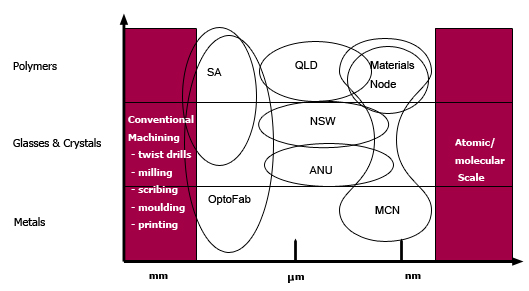|
ANFF nodes have ‘cutting-edge’ equipment and the ability to
conduct a number of processing steps to produce an end product in a clean
environment. Each node offers expertise in a specific range of areas to meet
researchers’ diverse fabrication needs. The capability provided enables users to
process hard materials (metals, composites and ceramics) and soft materials
(polymers and polymer-biological moieties) and transform these into structures
that have application in sensors, medical devices, nanophotonics and
nanoelectronics.
For more information about the capability at each node, click on
the diagram below: |
|
|
|
|
- MCN
Melbourne Centre for Nanofabrication: Monash University, CSIRO,
Deakin University, LaTrobe University, RMIT, Swinburne University, The
University of Melbourne |
|
- ACT
Australian National University, University of Western
Australia |
|
- Materials Node
University of Wollongong, University of
Newcastle |
|
- NSW
University of New South Wales |
|
- OptoFab
Macquarie University, Bandwidth Foundry International, University of
Sydney |
|
- QLD
University of Queensland |
|
- SA
University of South
Australia |
|

